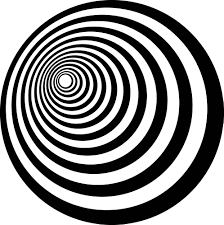spiral
英 [ˈspaɪə.rəl]
美 [ˈspaɪr.əl]
- n. 螺旋;旋涡;螺旋形之物
- adj. 螺旋形的;盘旋的
- vt. 使成螺旋形;使作螺旋形上升
- vi. 盘旋;成螺旋形;螺旋形上升(过去式spiraled/spiralled,过去分词spiraled/spiralled,现在分词spiraling/spiralling,第三人称单数spirals,副词spirally)
使用频率:

记忆方法
1. 谐音“死掰螺”。
中文词源
spiral 螺旋的,螺旋式的
来自拉丁语 spipralis,旋转的,螺旋的,来自 spira,线圈,绕圈,来自 PIE*sper,转动,旋转, 可能来自 PIE*spen,弯,转,纺织,词源同 spider,spin.
英语词源
- spiral
-
spiral: [16] Spiral comes via French spiral from medieval Latin spīrālis ‘coiled’, a derivative of Latin spīra. This in turn went back to Greek speira ‘coil’. English also acquired the noun, as spire [16], which is used for the ‘tip of a spiral shell’. It is not the same word as the spire of a church [OE], which originally meant ‘stalk, stem’, and may go back ultimately to the base *spī- (source of English spike ‘pointed flower head’ and spine). The spiraea [17] is etymologically the ‘coiled’ plant; and spiraea in turn was used to form the term aspirin.
=> aspirin, spiraea - spiral (adj.)
- 1550s, from Middle French spiral (16c.), from Medieval Latin spiralis "winding around a fixed center, coiling" (mid-13c.), from Latin spira "a coil, fold, twist, spiral," from Greek speira "a winding, a coil, twist, wreath, anything wound or coiled," from PIE *sper-ya-, from base *sper- (2) "to turn, twist." Related: Spirally. Spiral galaxy first attested 1913.
- spiral (v.)
- 1726 (implied in spiraled), transitive, from spiral (n.). Intransitive use by 1834. Transferred and figurative sense by 1922. Related: Spiraling.
- spiral (n.)
- 1650s, from spiral (adj.). U.S. football sense is from 1896. Figurative sense of "progressive movement in one direction" is by 1897. Of books, spiral-bound (adj.) is from 1937.
权威例句
- 1. The process is not a circle but rather a spiral.
- 这个过程不是一个圆周运动而是螺旋上升型的。
- 2. The spiral of terrorism becomes never-ending.
- 恐怖主义活动没完没了,不断升级。
- 3. The birds circled in a slow spiral above the house.
- 鸟儿在房子上空缓缓盘旋。
- 4. Her hair was styled into a cascade of spiral curls.
- 她的头发被做成了瀑布般的螺旋形鬈发.
- 5. Their profits began to spiral down disastrously.
- 他们的利润开始螺旋形地急剧下降.
